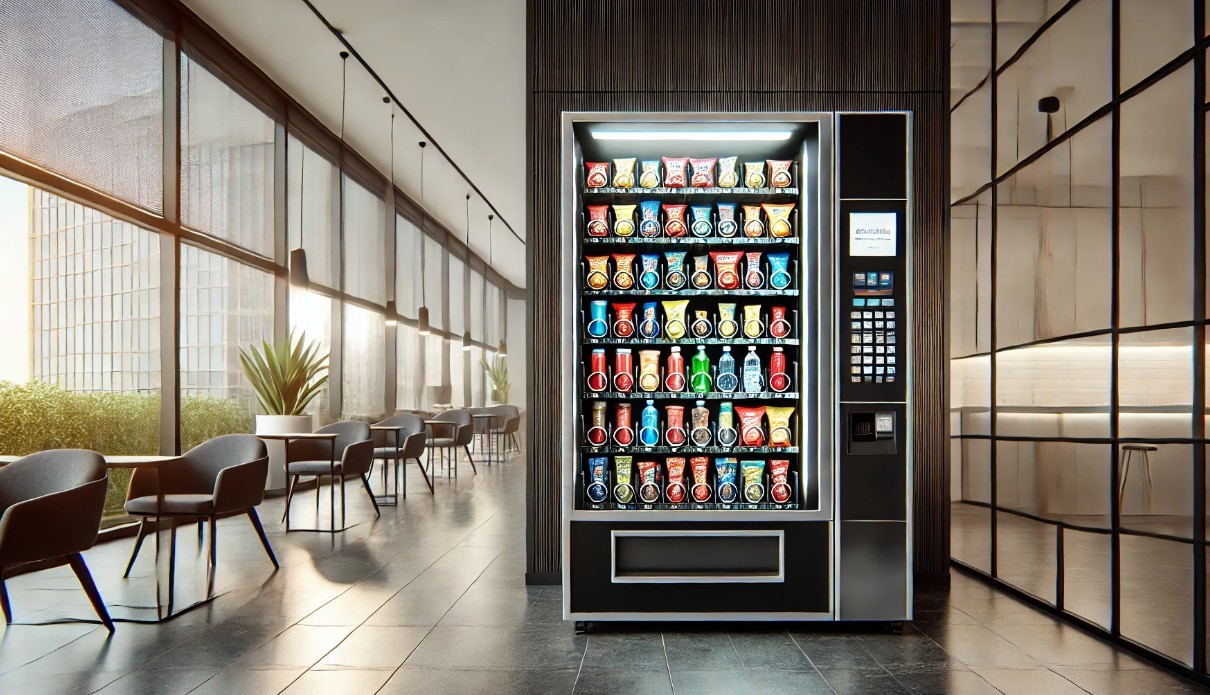How to Start a Successful Vending Machine Business in 2025?
Vending machines can fulfil consumer needs at any hour of the day in convenient locations or places where certain products would otherwise be difficult to buy.
The vending machine industry in the UK is thriving, with consumers preferring quick, self-service options for food, drinks, and specialty items.
For entrepreneurs, vending machines present an opportunity to generate passive income with minimal operational effort.
Whether you’re planning a side hustle or a full-scale vending operation, this guide will walk you through everything you need to know to start and grow a successful vending machine business in the UK.
What Is a Vending Machine Business?

A vending machine business involves placing automated machines in high-traffic areas to sell products such as snacks, beverages, electronics, or personal care items. The business can be run independently or as part of a franchise model.
What Are the Types of Vending Machine Businesses?
Vending machines can sell almost anything, but they typically fall into the following categories:
- Food & Drinks: Includes soda, coffee, crisps, and snacks. This is the largest sector, with drinks alone making up nearly 40% of vending machine sales.
- Bulk Vending: Sells gumballs, toys, and stickers. These machines are low-cost and don’t require electricity.
- Specialty Vending: Offers tech accessories, books, laundry essentials, and more, depending on location demand.
- Franchised Vending: Some vending businesses operate under established brands, allowing franchisees to benefit from brand recognition and support.
Choosing the right type depends on your budget, location opportunities, and consumer demand.
How Does a Vending Machine Business Work?
A vending machine business operates by placing automated machines in strategic locations where consumers can purchase products without the need for human interaction.
The business model is relatively simple: you invest in vending machines, stock them with products, and generate income from each sale.
However, successful operation requires careful planning, regular maintenance, and strategic location selection.
How Do Vending Machines Generate Income?
Vending machines earn money based on:
- Product sales: The more foot traffic, the higher the sales.
- Markup on goods: Vending operators set their own prices, often doubling the wholesale cost to ensure profitability.
- Multiple revenue streams: Some vending machine owners rent out advertising space on their machines.
The profitability of a vending machine business depends on several key factors, including location, product selection, payment options, and operational efficiency.
What Are the Daily Operations of a Vending Machine Business?

Running a vending machine business may seem passive, but it requires consistent management. The key responsibilities include:
- Restocking Inventory: Regularly replenishing stock to prevent machines from running empty.
- Tracking Sales: Using vending management software (VMS) to monitor performance and sales trends.
- Handling Maintenance and Repairs: Ensuring machines remain in working condition by fixing jammed products, replacing faulty bill acceptors, and addressing technical malfunctions.
- Managing Payments: Collecting cash and processing digital transactions via card payments and mobile wallets.
- Finding New Locations: Expanding the business by securing more high-footfall spots for vending machines.
With proper planning and automation tools, a vending machine business can be a scalable and semi-passive income stream.
How Can You Identify Profitable Opportunities in the UK Market?
Understanding the UK vending market is crucial before investing in vending machines. The demand for cashless, convenient, and contactless shopping is at an all-time high, making vending machines an attractive business opportunity.
However, competition, location, and product selection play a significant role in determining profitability.
Performing Market Research
- Market research helps vending business owners identify demand, analyse competitors, and select high-profit locations.
Here’s how to conduct effective market research:
- Assess local demand: Identify areas with high foot traffic where vending machines would be a valuable addition.
- Analyse competitors: Study existing vending machine businesses in key locations and evaluate what they offer.
- Find market gaps: Look for areas that lack vending machines or have limited product options.
- Check foot traffic trends: Visit potential vending sites at different times of the day to estimate sales potential.
Where Are the Best Locations for a Vending Machine Business?

The success of a vending machine business is highly dependent on location. Some of the best locations include:
| Location | Why It Works? |
| Corporate Offices | Employees seek quick snacks and drinks during breaks. |
| Shopping Centres | High customer turnover ensures strong sales. |
| Gyms & Fitness Centres | Demand for healthy snacks, protein bars, and drinks. |
| Hospitals & Clinics | Staff, patients, and visitors need convenient refreshments. |
| Universities & Schools | Students prefer affordable and accessible food options. |
| Transport Hubs | Airports, train stations, and bus terminals have a high demand for on-the-go snacks. |
What to Consider When Choosing a Location?
- Foot Traffic Volume: More people passing by means more sales opportunities.
- Target Audience: Match product selection to the customer base.
- Competitive Presence: Choose locations with minimal vending competition.
- Placement Agreements: Some locations require rental fees or commission-sharing with property owners.
By conducting thorough market research and selecting the right locations, vending machine owners can maximise profitability and long-term success.
What Are the Key Steps to Set Up a Vending Machine Business?

Step 1: Create a Business Plan
A well-structured business plan outlines your vending business strategy, helping you stay focused and secure funding if needed. Your plan should include:
- Business Model: Independent ownership or franchise-based.
- Target Audience: Office workers, students, gym-goers, etc.
- Product Strategy: Snacks, drinks, healthy options, tech accessories, etc.
- Revenue Projections: Expected costs and profits.
Step 2: Register Your Business
In the UK, you need to legally register your vending machine business. The most common options are:
- Sole Trader: Simple and easy registration with HMRC.
- Limited Company: Provides liability protection but requires more administration.
You may also need:
- Public liability insurance (to protect against customer claims).
- Business bank account (for financial transactions).
- Vendor’s licence (some councils require permits for vending machines in public spaces).
Step 3: Choose the Right Products to Sell
Selecting profitable products is key to success. Popular vending machine products include:
- Soft drinks, energy drinks, and bottled water.
- Snacks such as crisps, chocolate bars, and protein bars.
- Coffee, tea, and hot chocolate for office and transport locations.
- Healthy options like nuts, dried fruits, and granola bars.
Market research helps determine which products will sell best in different locations.
Step 4: Find a Suitable Vending Machine
Vending machines range from basic mechanical models to smart machines with touchscreen displays and cashless payment options. Decide on:
- New vs. Used Machines: New machines come with warranties, while used machines are more affordable.
- Size & Capacity: Consider machine dimensions based on available space.
- Technology Features: Cashless payment options, remote inventory monitoring, and energy efficiency.
Step 5: Secure a High-Footfall Location
- Research high-traffic areas such as offices, malls, transport hubs, and gyms.
- Approach property owners and negotiate placement agreements (either through rent or commission-based revenue sharing).
Step 6: Install and Stock Your Machine
- Purchase initial stock based on market demand.
- Monitor sales to adjust inventory and optimise product selection.
- Regularly clean and maintain machines to ensure smooth operation.
By following these key steps, vending business owners can establish a profitable operation with minimal ongoing management.
How Do You Choose the Right Vending Machines and Suppliers?
New vs. Used Vending Machines: Which One to Choose?
| Factor | New Machines | Used Machines |
| Cost | £2,000 – £10,000 | £800 – £2,000 |
| Warranty & Support | Manufacturer warranty | Limited or no warranty |
| Technology | Latest features (touchscreen, cashless payments, AI monitoring) | Basic functionality |
| Maintenance | Lower due to new parts | May require more repairs |
What Features Should You Look for in a Vending Machine?
- Cashless Payment Options: Card payments, Apple Pay, and Google Pay.
- Remote Monitoring Software: Track stock levels and performance.
- Energy-Efficient Models: Reduce operational costs.
Where Can You Buy Vending Machines in the UK?
- Direct from manufacturers (for brand-new machines).
- Wholesale suppliers (bulk purchases at discounted prices).
- Online marketplaces (buying used machines from resellers).
Choosing the right vending machines and suppliers is essential for ensuring long-term profitability and smooth operations.
How Do You Stock and Manage Your Vending Machines Effectively?

Stocking and managing vending machines properly ensures that they stay profitable, well-maintained, and stocked with popular products.
A poorly managed vending machine can lead to lost sales, expired products, and customer dissatisfaction.
How to Choose the Right Products for Your Vending Machines?
The best-selling products vary depending on the location and target audience. Below are some common vending machine product categories:
Best-Selling Vending Machine Products by Location
| Location | Best-Selling Products |
| Offices & Business Parks | Coffee, tea, energy drinks, protein bars, crisps, chocolate bars |
| Gyms & Fitness Centres | Protein shakes, water, energy bars, electrolyte drinks |
| Schools & Universities | Crisps, fizzy drinks, instant noodles, bottled water, gum |
| Hospitals & Healthcare Centres | Healthy snacks, bottled water, granola bars, herbal teas |
| Transport Hubs | Energy drinks, cold coffee, packaged sandwiches, tech accessories |
How to Monitor and Restock Vending Machines Efficiently?
- Use Vending Management Software (VMS): Tracks stock levels remotely and alerts you when products need restocking.
- Analyse Sales Trends: Adjust stock based on best-selling items and remove slow-moving products.
- Optimise Restocking Schedule: Machines in high-traffic locations may need daily refills, while low-traffic locations can be restocked weekly.
- Buy in Bulk: Reduces costs and increases profit margins.
- Check Expiry Dates Regularly: Expired products lead to complaints and loss of revenue.
By maintaining stock efficiently and responding to customer demand, vending operators can increase sales and customer satisfaction.
How Can You Fund a Vending Machine Business?
Starting a vending machine business requires an initial investment for purchasing machines, stock, and securing locations. If you don’t have enough capital upfront, there are several funding options available.
What Are the Costs of Starting a Vending Machine Business?
| Expense | Estimated Cost (GBP) |
| Vending Machine (New) | £2,000 – £10,000 |
| Vending Machine (Used) | £800 – £2,000 |
| Initial Stock | £300 – £1,000 |
| Location Rent/Commission | £50 – £500/month |
| Maintenance & Repairs | £100 – £300/year |
Funding Options for a Vending Machine Business
| Funding Option | Description |
| Equipment Loans & Leasing | Loans to buy or lease vending machines, repayable over 1–3 years. |
| Small Business Loans | Covers equipment, stock, and operational costs. |
| Franchising | Join an established brand with funding and support options. |
| Investor Partnerships | Find an investor to provide startup capital in exchange for profit sharing. |
| Crowdfunding | Raise money from multiple backers online through crowdfunding platforms. |
Tip: Always read the fine print on any loan or financing agreement to avoid hidden fees or high interest rates.
How Can You Expand Your Vending Machine Business?

Once your vending machine business is generating consistent revenue, you may consider expanding to increase profits. Expansion can involve adding more machines, diversifying product offerings, or entering new markets.
Steps to Scale Your Vending Business Successfully
- Monitor Sales & Performance: Identify high-performing locations and expand in similar areas.
- Reinvest Profits: Use earnings from one machine to finance new machines and locations.
- Upgrade Technology: Invest in smart vending machines with cashless payments and remote stock monitoring.
- Expand Product Offerings: Consider selling premium snacks, healthy options, or tech accessories.
- Explore Franchising Opportunities: Some vending businesses grow by franchising their operations to new partners.
- Automate Operations: Use AI-driven vending systems to optimise inventory and pricing.
What Is the Difference Between a Traditional Vending Machine and an Automated Retail Machine?
| Feature | Traditional Vending Machines | Automated Retail Machines (ARMs) |
| Product Types | Snacks, drinks, basic items | High-end tech, cosmetics, specialty goods |
| Payment Methods | Cash, cards, mobile payments | Touchscreen ordering, AI-driven payments |
| Maintenance | Manual restocking & tracking | Automated inventory & real-time analytics |
Conclusion
A vending machine business in the UK can be highly profitable with the right strategy.
By choosing prime locations, stocking popular products, and leveraging smart technology, entrepreneurs can create a sustainable and scalable business.
Ready to start your vending machine business in 2025? Now’s the time to take action!
FAQs
How much does it cost to start a vending machine business in the UK?
The startup cost can range from £1,500 to £10,000, depending on whether you buy new or used machines, the number of locations, and initial stock purchases.
What are the best locations for vending machines?
High-traffic areas such as offices, shopping centres, transport hubs, gyms, hospitals, and universities are ideal for vending machines.
How much can a vending machine earn per month?
Earnings vary based on location and product selection, but a well-placed machine can generate between £200 and £1,000 per month.
Do vending machines need a licence in the UK?
In most cases, you don’t need a specific licence, but some local councils may require permits if placing machines in public spaces.
Can I run a vending machine business part-time?
Yes! A vending machine business requires minimal daily management, making it ideal as a side business or passive income stream.
How do I maintain a vending machine?
Regular maintenance includes cleaning the machine, restocking products, checking for technical issues, and updating payment systems. Using vending management software can help monitor stock levels remotely.







